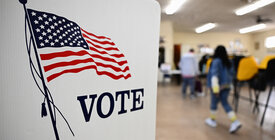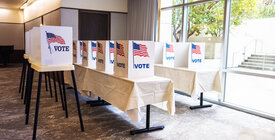Written and published in partnership with All Voting is Local, with special thanks to Jenner & Block, LLP
Wisconsin, like most states, allows private individuals to challenge another person’s eligibility to vote. This resource details state laws that govern this process and protect challenged voters. Wisconsin’s voter protections include an affidavit requirement and a “beyond a reasonable doubt” standard for pre-election challenges, as well as provisions for removing people who abuse the challenge process on Election Day.
Protections for voters challenged before an election
- Only a registered voter from the same municipality can challenge another voter before an election. 1
- The challenge can only be made by filing an individualized affidavit with the municipal clerk, or, in large cities with populations over 500,000 (currently only Milwaukee), with the board of election commissioners. 2
- Upon receipt of such a challenge, the clerk or board must mail a notice to the challenged voter. 3
- The challenger and the challenged voter must appear before the clerk within one week of notification, or, in large cities, arrange to appear before the board on a day set to hear challenges. 4
- The burden is on the challenger to prove “beyond a reasonable doubt” that the challenged voter is not qualified to vote. 5
- If the challenger does not appear at the clerk’s office within one week of notification or, in large cities, at the board on the prescribed day, the clerk or board must dismiss the challenge. 6
- If the challenged voter appears and answers questions about and swears to their eligibility under oath, the challenge should be rejected. 7
Protections for voters challenged during the election
- Only an eligible Wisconsin voter or election inspector can challenge another voter during in-person voting. 8Election inspectors under 18 cannot bring a challenge.
- Only an election inspector can challenge the sufficiency of a voter’s ID. 9
- The challenger must show “reasonable cause,” and must assert a ground listed on the state’s Challenge Documentation form. 10
- “Any challenge based on an individual’s ethnicity, accent, or inability to speak English is unacceptable. The challenge should be dismissed, and an unmarked ballot issued to the voter.”11
- The election inspector must place the challenger under oath and question them as to the ground for and evidence in support of the challenge. 12If an election inspector challenges a voter, another inspector must administer the process to ensure fairness. 13
- If the challenger does not provide sufficient information to support the challenge, the inspector must dismiss the challenge and the challenged voter is allowed to vote without any notation being placed on the ballot. 14
- If the challenger provides sufficient information to support a challenge, the inspector then places the challenged voter under oath and asks them questions about their eligibility. 15They must do so “in a calm and respectful manner.”16
- If the challenged voter swears to the relevant facts establishing their eligibility, the inspector must let them vote. 17The inspector must include the voter’s unique serial number and the reason for the challenge on the back of the ballot. 18
The absentee ballot board follows a similar procedure for challenges to absentee ballots. 19
Accountability for challenge abuses
- The chief inspector or municipal clerk can remove any individual who abuses the challenge process by making challenges frivolously or in bad faith on Election Day. 20
- Individuals who make false statements challenging a voter, either before or during the election, may also be subject to criminal penalties. 21
• • •
Voters in Wisconsin have the right to vote free from intimidation under federal and state law. Baseless challenges to a voter’s eligibility can harass and intimidate the voter being challenged, as well as other voters waiting to vote at the polls. More information on the federal and state laws that protect Wisconsin voters from intimidation can be found here.
If voters discover they’ve been mistakenly removed from the rolls, they can re-register and vote at their municipal clerk’s office or an early voting site until 5 p.m. on the Friday before the election or at their polling place on Election Day. 22
Endnotes
-
1
Wis. Stat. § 6.48(1)(a).
-
2
Id.
-
3
Id.
-
4
Wis. Stat. § 6.48(1)(b).
-
5
Wis. Stat. § 6.325.
-
6
Wis. Stat. § 6.48(1)(c).
-
7
Wis. Stat. §§ 6.48(1)(b), (2)(b).
-
8
Wis. Stat. §§ 6.92, 6.925.
-
9
Wisconsin Elections Commission, Election Day Manual for Wisconsin Election Officials, February 12, 2024, 71, https://elections.wi.gov/sites/default/files/documents/ED%20Manual-February%202024.pdf.
-
10
WI Elections Commission, “Challenge Documentation Form EL-104C,” last accessed May 21, 2024, https://elections.wi.gov/sites/default/files/legacy/2020–07/EL-104c%2520Challenge%2520Documentation%2520%25282020–07%2529.pdf; Wis. Admin. Code. §§ EL 9.01-.02.
-
11
WI Elections Commission, Election Day Manual for Wisconsin Election Officials, 74.
-
12
Wis. Stat. § 6.925; Wis. Admin. Code. § EL 9.02(1)-(2).
-
13
WI Elections Commission, Election Day Manual for Wisconsin Election Officials, 72.
-
14
Wis. Stat. § 6.925; WI Elections Commission, “Challenge Documentation Form EL-104C.”
-
15
Wis. Stat. § 6.94.
-
16
WI Elections Commission, Election Day Manual for Wisconsin Election Officials, 72.
-
17
Wis. Stat. § 6.94.
-
18
Wis. Stat. § 6.95.
-
19
Wis. Stat. §§ 7.52(5), 6.93; Wis. Admin. Code. § EL 9.04.
-
20
Wis. Stat. § 7.41(3); Wis. Admin. Code. § EL 9.02.
-
21
Wis. Stat. §§ 12.13(1)(b), 12.13(3)(g), 946.32(1)(a).
-
22
Wis. Stat. § 6.29.


